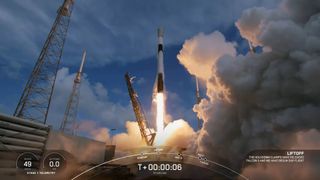SpaceX Starlink satellites face Russia space debris 'squalls' in orbit: report
It appears Group 3 is particularly prone to "close encounters" due to its orbit lining up with the space debris.

SpaceX's Starlink constellation faced a Russian space debris "squall" on Aug. 6, according to a media report.
SpaceX satellites in the Starlink constellation came close to debris generated by a Russian anti-satellite test in November, Dan Oltrogge, chief scientist at COMSPOC, said at a Secure World Foundation event during the Small Satellite Conference Monday (Aug. 8). The story was first reported by SpaceNews.
The company, which tracks space objects and generates reports for clients, said pieces of the now-destroyed Cosmos 1408 satellite are lining up with satellites launched in a sun-synchronous orbit, meaning an orbit that keeps the sun at a constant altitude relative to Earth.
Oltrogge, calling the close encounter Starlink event a "conjunction squall," said his company spotted more than 6,000 close approaches affecting 841 satellites, representing about 30% of the constellation. (SpaceX has emphasized its Starlinks can maneuver, but did not comment on the story or whether any Starlinks were affected.)
Conjunctions by COMSPOC standards are defined as two objects being within 6 miles or 10 kilometers of each other.
The new squall was in part generated by SpaceX launching a new set of satellites, termed Group 3, that are in a similar orbit to other sun-synchronous satellites that have come close to ASAT debris in the past. "It's the very orbit that's put at risk by the ASAT," Oltrogge said.
SpaceX has already sent two satellite group members into orbit on July 10 and July 22, both from Vandenberg Space Force Base in California, SpaceNews said. A third clutch of satellites in this group is expected to launch Friday (Aug. 12).
Get the Space.com Newsletter
Breaking space news, the latest updates on rocket launches, skywatching events and more!
Starlink has five orbital "shells" or layers, according to Teslarati, with each one differing by orbital altitude along with orbital inclination, meaning the angle between the orbit and the Earth's equator. Group 3 is said to be at an inclination of 97.6 degrees and at an altitude of 347 miles (560 km.)
SpaceX has not been immune to criticism about space debris concerns generated by itself, however. In August 2021, when Starlink was much smaller as a constellation, a leading European expert on space debris said the satellites were responsible for more than half of close encounters in orbit.
Follow Elizabeth Howell on Twitter @howellspace. Follow us on Twitter @Spacedotcom or on Facebook.
Join our Space Forums to keep talking space on the latest missions, night sky and more! And if you have a news tip, correction or comment, let us know at: community@space.com.

Elizabeth Howell (she/her), Ph.D., is a staff writer in the spaceflight channel since 2022 covering diversity, education and gaming as well. She was contributing writer for Space.com for 10 years before joining full-time. Elizabeth's reporting includes multiple exclusives with the White House and Office of the Vice-President of the United States, an exclusive conversation with aspiring space tourist (and NSYNC bassist) Lance Bass, speaking several times with the International Space Station, witnessing five human spaceflight launches on two continents, flying parabolic, working inside a spacesuit, and participating in a simulated Mars mission. Her latest book, "Why Am I Taller?", is co-written with astronaut Dave Williams. Elizabeth holds a Ph.D. and M.Sc. in Space Studies from the University of North Dakota, a Bachelor of Journalism from Canada's Carleton University and a Bachelor of History from Canada's Athabasca University. Elizabeth is also a post-secondary instructor in communications and science at several institutions since 2015; her experience includes developing and teaching an astronomy course at Canada's Algonquin College (with Indigenous content as well) to more than 1,000 students since 2020. Elizabeth first got interested in space after watching the movie Apollo 13 in 1996, and still wants to be an astronaut someday. Mastodon: https://qoto.org/@howellspace
